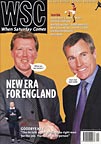 Like England, Holland have a tradition of using club managers to run the national team. Unlike England, it doesn't change the way the play, says Simon Kuper
Like England, Holland have a tradition of using club managers to run the national team. Unlike England, it doesn't change the way the play, says Simon Kuper
Holland have a dastardly way of choosing a manager. It works like this: a few old men at the Dutch FA settle upon some appropriate chap, usually a good club coach, always overlooking the best candidate (Johan Cruyff) on the grounds that he is difficult.
This may sound familiar. The only difference with the English procedure is that the Dutch one works. That is because the Dutch have a secret. Holland used to play a slow, passing game that never got them anywhere. By the time they finally qualified for a World Cup, in 1974, Cruyff and Rinus Michels had invented a Dutch style of football. Its secret ingredients can now at last be revealed: a keeper who could play football, overlapping backs, two wingers, and an emphasis on passing and thinking. This style was known in Britain (though never in Holland) as total football. If pressed, the Dutch will call it the Hollandse stijl.
Total football took Holland to two World Cup finals, but after 1978 they forgot it. The manager of the early 1980s, Kees Rijvers, wanted to play like Brazil, while the Ajax manager, Aad de Mos, recommended a switch to catenaccio. Holland missed the 1982 and 1986 World Cups. However, half way through 1985, something had changed. Cruyff became manager of Ajax and returned the club to total football (though he never called it that).
Then Michels became manager of Holland again. Using a spine of players from Cruyff’s Ajax, he returned the national team to total football (though he never called it that). Each manager since then has had Holland playing total football (though he never calls it that). Sometimes a detail changes: for instance, very attacking wide midfielders might be used instead of wingers. That is about as wild as variation gets.
Every manager picks players for their ability to pass. No one plays because he is a “great athlete” or a “great servant of his country” or “will always be my captain” or because he once played on when his head was bleeding. No one is urged to “go out and throw a few hand grenades”. While Holland have a footballing culture, England lack one, which is why the anointing of an England coach is always accompanied by drama.
Each England coach espouses a different culture. Graham Taylor and Terry Venables picked very different players. Keegan picked the same players as Hoddle and Venables, but made them play differently, which was why the Sol Campbell of Hoddle’s era could pass and the Campbell of Keegan’s era could not. Taylor believed in the long ball, Hoddle and Venables in the pass, and Keegan in “heart”. However, only one of these cultures works. All good international teams are built around the pass. As Cruyff explained on the BBC this summer: “There is only one ball on the field.” This is the core belief of Dutch football.
With the culture set, the identity of the manager is scarcely relevant. Even if it were Keegan he probably couldn’t change much. When he took over England, Keegan was called a “messiah”, but the new Dutch manager never is. His appointment is low-key, like the choice of the Queen’s commissioner for the province of Groningen. Happy is the land that has no need of heroes.
Certainly Dutch football culture is flawed. There is a blindness to all virtues besides the ability to pass. This means that Winston Bogarde, perhaps the best Dutch man-marker, didn’t make the squad for Euro 2000 because he passes poorly. Jimmy Floyd Hasselbaink, another modest passer, was left out of the squad because all he can do is score. By contrast, Frank de Boer, the team’s captain, has won 85 caps in Holland’s defence even though he makes frequent blunders. Dennis Bergkamp, the Platonic ideal of a Dutch footballer, was always picked even when his “heart” sank to barely perceptible levels.
Dutch managers do make mistakes, but they all make the same ones. All have picked Frank de Boer. None has liked Hasselbaink. Guus Hiddink’s team of 1998 became Frank Rijkaard’s team in 2000 and, minus Bergkamp, will be Van Gaal’s team in 2002 if Holland qualify. When the Dutch fail, the culture is never questioned. When they lost in Euro 2000, no one said Rijkaard should have picked players with “heart”. Instead, people said he should have sent on Pierre van Hooijdonk as a late sub against Italy.
It doesn’t matter where England find their managers. What matters is to find a culture that works, and to stick to it. And only one culture works.
From WSC 166 December 2000. What was happening this month